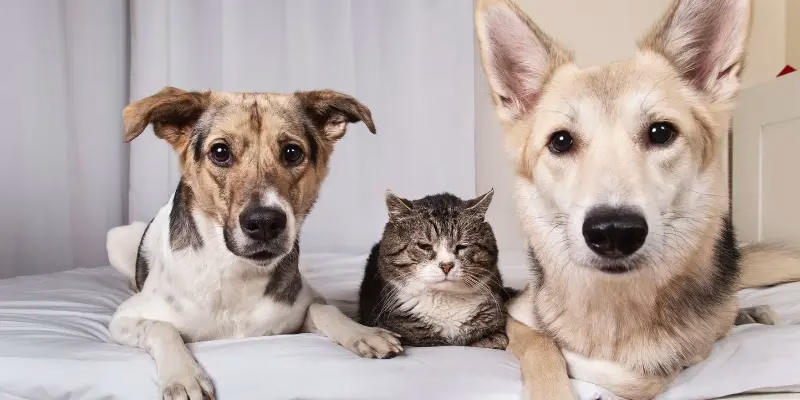Senior Cats
We love to see senior cats!
Cats aged 7 years and older are considered seniors. At this age, life tends to take a slower pace and you may notice some changes in your cat’s behaviour and daily routines as they move into their golden years. Whilst this is typical of older animals, it can also be symptomatic of a number of health conditions which require medical attention.

Cats need a little extra care and attention in their senior years, and this includes more frequent trips to the vet as older animals are more susceptible to illness and their condition tends to deteriorate faster than in a younger animal. Because of this, we recommend bringing your cat in for a check-up once every six months. On this page, we take a look at some of the most common health conditions affecting senior cats.
Dental disease
High blood pressure
Another common condition amongst older cats, high blood pressure has been linked to blindness, kidney disease, and thyroid issues. Regular blood pressure testing helps us monitor any changes in your senior cat’s blood pressure and can play an important role in the diagnosis of serious health conditions which might otherwise go unnoticed.
Kidney and thyroid disease
Annual blood testing for senior cats can screen for two of the ‘silent killer’ diseases, kidney and thyroid disease, which are common in older cats but often go undiagnosed until the disease is advanced and much more challenging to manage.
Arthritis
Just like with older humans, senior cats get aches and pains. Arthritis in cats can be painful and debilitating, but happily the condition can be managed through medication and a few small lifestyle changes. Behavioural changes such as a reluctance to jump up or a decrease in grooming are two common signs that your cat may be suffering from arthritis.
Need an appointment?
When your pet’s unwell, or it’s time for a general check-up or vaccination, your furry friend is in good hands. Book online to see our expert Vets on Balwyn!
Contact Details
Opening Hours
Monday – Friday: 8am – 7pm
Saturday: 9am – 2pm
Sunday: Closed
Vets on Balwyn Feedback
EXCELLENTTrustindex verifies that the original source of the review is Google. What an outstanding experience I have had at Vets on Balwyn.! Super easy online booking, wonderful and warm reception staff in clean and calm environment. I saw Vivienne Tan who was so lovely, compassionate and understanding of my hyper anxious Jack Russell and she was gentle, kind, friendly and very patient with him. There was no pressure to rush my consultation and she offered so many solutions and great advice. I have been a pet owner for many years and this was truly a unique and exceptional experience. I highly recommend this practice to everyone. They have a client for life.Posted onTrustindex verifies that the original source of the review is Google. A great Vet clinic with very friendly and professional staff. We wouldn't take our cats anywhere else.Posted onTrustindex verifies that the original source of the review is Google. Truly one of the best vet clinics — if not the best. We are so incredibly grateful to the amazing team here. A heartfelt thank you to Dr. Michelle and Dr. Vivienne — words can’t fully express how much we appreciate everything you’ve done for our beloved kitties, Leon and Luna. You’ve treated them with such kindness, patience, and genuine compassion. You're not only knowledgeable but also incredibly honest, which we deeply value and respect. Knowing our cats are in such caring and trustworthy hands gives us so much peace of mind. And not to forget the wonderful nurses and support staff — every single one of you has been so warm, welcoming, and understanding. You’ve helped create such a comforting, positive environment, and we always feel supported and cared for during every visit. Even though the clinic is a bit of a drive, especially during peak hours, it’s always worth the trip — because we know our fur babies are getting the best care possible. From the bottom of our hearts, thank you. We wholeheartedly recommend this amazing team to anyone looking for vets who are not only skilled but genuinely, honestly care.Posted onTrustindex verifies that the original source of the review is Google. Awesome staff and helpful team. Vet Dr Michelle was amazing. I would take my Malinois anywhere else.Posted onTrustindex verifies that the original source of the review is Google. Dr Kevin and the team at Vets on Balwyn and Vets on Parker have looked after my fussy fur babies (x3) for 10+ years. Dr Kevin is compassionate and I trust him with their care both in life and euthanasia. Wouldn’t go anywhere else.Posted onTrustindex verifies that the original source of the review is Google. Excellent veterinary service. Dr Campbell clearly passionate about delivering high standard of care.Posted onTrustindex verifies that the original source of the review is Google. Vets on Balwyn has been looking after Samson for about 10 years now. All the staff, nurses and vets, are courteous, responsive and professional. Thank you all for your great service all these years. My special thanks to Dr Vivienne who is very knowledgeable, caring , patience and professional. We are very grateful to you for your excellent care provided to Samson.Posted onTrustindex verifies that the original source of the review is Google. A very caring and professional team at Vets in Balwyn. We visited Dr Michelle Rasool today and she was very patient and encouraging with my little dog, who is reactive when going to the vets. Dr Rasool is very experienced and explained everything as we went along so I understood and this will help with future visits. Im very pleased with our visit today.

